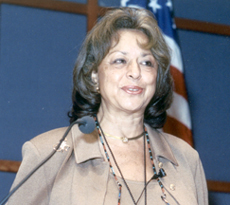
| T H E N I H C A T A L Y S T | M A Y – J U N E 2007 |
|
|
|
ORWH
WELCOMES FIRST
TWO AWARDEES OF THE
WOMEN'S
HEALTH FELLOWSHIP
|
|
 |
|
Vivian
Pinn
|
The first two recipients of the NIH Women’s Health Fellowship—a cornerstone of the Intramural Program on Research on Women’s Health (IPRWH)—have taken up residence in their respective locations at NHGRI and NIEHS.
Developed through an OIR-ORWH collaboration, the three-year fellowships were funded through the Foundation for the NIH (FNIH) with donations from the Battelle Memorial Institute and AstraZeneca, the former in support of the Shared Postdoctoral Fellowship and the latter in support of the Clinical/Translational Fellowship.
Suzanne O’Neill, recipient of the postdoctoral fellowship, obtained her doctorate in clinical psychology from the University of Delaware in Newark, did a clinical internship in behavioral medicine at the Medical University of South Carolina in Charleston, and did postdoctoral work at the University of North Carolina Lineberger Comprehensive Cancer Center in Chapel Hill before joining NHGRI’s Social and Behavioral Research Branch. Shannon Laughlin, awarded the clinical/translational fellowship, completed her final year of residency in obstetrics and gynecology at Loyola University in Chicago before joining the NIEHS Epidemiology Branch.
"Recruiting women into research positions and advancing their careers are important aspects of the ORWH mission, and promoting basic and clinical studies relevant to women’s health, as well as studies involving sex and gender factors, are priorities for us," observed Vivian Pinn, ORWH director and associate director for research on women’s health.
"We’re excited to be able to offer the first formal opportunities for scientists to pursue fellowships in women’s health research within the NIH intramural program," she said.
The goal of the IPRWH is to serve as the focal point for all NIH intramural women’s health research, including sex and gender comparisons.
Pinn
noted that more than 50 NIH labs offered to host and mentor the researchers.
"There was no shortage of applicants, and I was very pleased with the number
of NIH scientists who were interested and ready to accept and mentor a fellow,"
she said. There is also no dearth of innovative projects in the realm of women’s
health research. The one current limiting factor is the availability of fellowship
opportunities, but Pinn is optimistic that continuing commitment from the FNIH
and its private partners will enable the continuation and, she hopes, expansion
of the program. ![]()
| The
Women’s Health Special Interest Group sponsors a lecture series. For
more information, go to the NIH
Interest Group website and
scroll down to the Women’s Health SIG. ORWH now airs a monthly podcast—called "Pinn Points on Women’s Health"—with ORWH Director Vivian Pinn and NIH staffers involved in women’s health research. These timely discussions can be found at this website. |
|
O'NEILL
JOINS
NHGRI STUDY |
LAUGHLIN
SEEKS
CLUES TO VULNERABILITY TO AND PREVENTION OF UTERINE FIBROIDS |
||||
Suzanne O’Neill, awarded the Shared Postdoctoral Fellowship, has examined the emotional and behavioral responses of women seeking genetic testing for BRCA1/BRCA2 breast- and ovarian-cancer susceptibility genes Her Women’s Health Fellowship work in NHGRI’s Social and Behavioral Research Branch is a "natural fit," she observes, with her research interest in "individualized preventive medicine based on genetic risk and differences in the processing of health risk information related to genetic disease." O’Neill is working directly with Colleen McBride, the NHGRI branch chief and lead investigator in the newly launched Multiplex Initiative, a joint project of NHGRI and NCI and two extramural groups. The study will offer individuals genetic testing for genes that play roles in eight common conditions: diabetes, coronary heart disease, high cholesterol, hypertension, osteoporosis, lung cancer, colorectal cancer, and malignant melanoma. O’Neill
will analyze data from the Multiplex Initiative, which will examine family
history and behavioral risk factors as predictors of disease attributions.
This information will add to existing knowledge that will facilitate the
development of interventions that address how people process and act on
personal health information. |
Shannon Laughlin’s Clinical/Translational Fellowship is advancing research on uterine fibroids, a condition that captured her interest during her residency in obstetrics and gynecology at Loyola University in Chicago. She is particularly motivated by by the difference between African American and white patients in the prevalence and severity of fibroids. This common disorder, though rarely malignant, can still lead to anemia and the need for blood transfusions and is also the leading reason for hysterectomies. Laughlin’s research plan is to identify factors that place women at high risk of developing fibroids and to determine whether early identification and treatment of high-risk women—or perhaps preventive measures—will reduce the need for surgery. Her research aim is to elucidate how fibroids grow, why parity is protective, and what role race may play in disease development. She anticipates that her training in the Epidemiology Branch will also enhance her statistical and epidemiological skills for future research. The
fellowship, Laughlin says, confers another benefit: "the opportunity
to have strong mentorship"—she is working with PI Donna
Baird, a reproductive epidemiologist with a distinguished track record
in public-health research. |